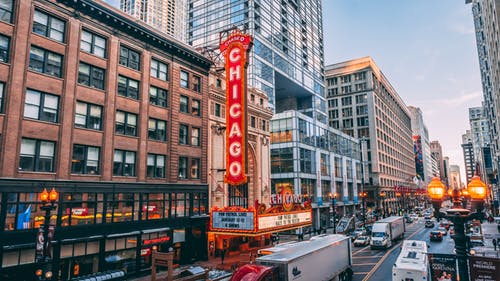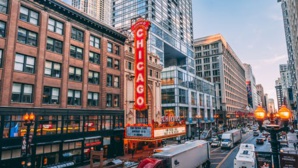Dailycsr.com – 25 February 2020 –In Chicago, people can find out about the “most populated sidewalk for a late-night journey” as well as the air quality of their respective neighbourhood and more, thanks to its Array of Things, in short the AoT, a “network of sensors”.
The role of AoT is to collect “real-time data” about the “urban environment” which tracks the level of carbon monoxide to traffic movements and anything in between. However, AoT could also fuel inequalities in the city if it wasn’t “widely accessible” or didn’t cater to the “needs and interests of residents” in the neighbourhood which had been neglected in the past while taking “decisions about public investments in technology and infrastructure”.
Moreover, concerns of the public over “heightened surveillance and data misuse” is also an important aspect. “The Mastercard Center for Inclusive Growth”in its “new report” explores the rapid change in the technology landscape which harbours the potential to “either promote inclusion or widen growing divides along race and economic status”.
Technology can be used as a leverage in cities like Chicago for infrastructure management, services improvement, better decision making and communication with the voters. However, The Mastercard Center for Inclusive Growthinformed:
“But we find that unless public investments in technology explicitly incorporate equity goals and engage historically excluded communities from planning to implementation, benefits are unlikely to be broadly shared, or worse, they may further entrench inequities”.
Thus, affected communities are taken into the decision making process as delivering on promises with the help of technology requires taking into account the “priorities of communities”.Therefore, active listening ang community engagement becomes an important aspect of the process. AoT in Chicago became a medium for communicating with the residents for their views on “government transparency around big investments”.
In 2016, the “Smart Chicago Collaborative” began to engage with the communities of “central and south” Chicago through AoT. Likewise, they strategized and worked through a “collaborative design process” wherein residents were taking on board through online as well as in person with the help of “nontechnical language” besides “thoughtfully navigating language barriers, and meeting in neighborhood public libraries”.
Data could be used to improve transparency in public investments, increase “leaders accountable to equity goals”, support “collaborative solutions”, “monitor noise and air pollution, track block-by-block climate and weather information and understand traffic patterns to reduce traffic congestion and improve pedestrian safety”.
On the other hand, St. Louis turns to tech for improving “fairness in the court system”.
“YourSTLCourts” tech tool helps CivTech St. Louis to bridge the disparities between “residents of color and white residents for nonviolent traffic offenses”, whereby becoming “an example of technology created for a more transparent and centralized system” can connect “residents with their own court data”. These afore mentioned steps to integrate technology for a better urban system set in “Chicago and St. Louis” show that technology can “employ more equitable practices and yield broader benefits when inclusion is an explicit part of their design and goals”.
While informing about the role of “Mastercard Center for Inclusive Growth” in these projects, it wrote:
“Our Accelerating Innovation for Inclusion Initiative, supported with a grant from the Mastercard Impact Fund, in collaboration with Mastercard Center for Inclusive Growth, will build on lessons learned from cities like Chicago and St. Louis and further explore how cities can utilize technology to improve public decision-making and deliver services, centering communities at each step”.
You can avail the entire report on the link provided below:
https://www.urban.org/research/publication/technology-and-equity-cities
References:
3blmedia.com
The role of AoT is to collect “real-time data” about the “urban environment” which tracks the level of carbon monoxide to traffic movements and anything in between. However, AoT could also fuel inequalities in the city if it wasn’t “widely accessible” or didn’t cater to the “needs and interests of residents” in the neighbourhood which had been neglected in the past while taking “decisions about public investments in technology and infrastructure”.
Moreover, concerns of the public over “heightened surveillance and data misuse” is also an important aspect. “The Mastercard Center for Inclusive Growth”in its “new report” explores the rapid change in the technology landscape which harbours the potential to “either promote inclusion or widen growing divides along race and economic status”.
Technology can be used as a leverage in cities like Chicago for infrastructure management, services improvement, better decision making and communication with the voters. However, The Mastercard Center for Inclusive Growthinformed:
“But we find that unless public investments in technology explicitly incorporate equity goals and engage historically excluded communities from planning to implementation, benefits are unlikely to be broadly shared, or worse, they may further entrench inequities”.
Thus, affected communities are taken into the decision making process as delivering on promises with the help of technology requires taking into account the “priorities of communities”.Therefore, active listening ang community engagement becomes an important aspect of the process. AoT in Chicago became a medium for communicating with the residents for their views on “government transparency around big investments”.
In 2016, the “Smart Chicago Collaborative” began to engage with the communities of “central and south” Chicago through AoT. Likewise, they strategized and worked through a “collaborative design process” wherein residents were taking on board through online as well as in person with the help of “nontechnical language” besides “thoughtfully navigating language barriers, and meeting in neighborhood public libraries”.
Data could be used to improve transparency in public investments, increase “leaders accountable to equity goals”, support “collaborative solutions”, “monitor noise and air pollution, track block-by-block climate and weather information and understand traffic patterns to reduce traffic congestion and improve pedestrian safety”.
On the other hand, St. Louis turns to tech for improving “fairness in the court system”.
“YourSTLCourts” tech tool helps CivTech St. Louis to bridge the disparities between “residents of color and white residents for nonviolent traffic offenses”, whereby becoming “an example of technology created for a more transparent and centralized system” can connect “residents with their own court data”. These afore mentioned steps to integrate technology for a better urban system set in “Chicago and St. Louis” show that technology can “employ more equitable practices and yield broader benefits when inclusion is an explicit part of their design and goals”.
While informing about the role of “Mastercard Center for Inclusive Growth” in these projects, it wrote:
“Our Accelerating Innovation for Inclusion Initiative, supported with a grant from the Mastercard Impact Fund, in collaboration with Mastercard Center for Inclusive Growth, will build on lessons learned from cities like Chicago and St. Louis and further explore how cities can utilize technology to improve public decision-making and deliver services, centering communities at each step”.
You can avail the entire report on the link provided below:
https://www.urban.org/research/publication/technology-and-equity-cities
References:
3blmedia.com


 Chicago & St. Louis Turn To Technology For Better Urban Governance
Chicago & St. Louis Turn To Technology For Better Urban Governance





 Companies
Companies